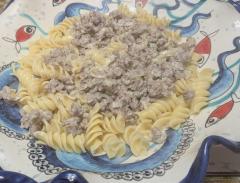 This is a delicious sauce made with cream and pork sausage. The town of Norcia in mountainous southeastern Umbria is renowned for its pork products, and it is the source of this simple and delicious recipe. The town is Norcia, and the sauce made in the style of Norcia uses the adjectival form Norcina, with the extra "n".
This is a delicious sauce made with cream and pork sausage. The town of Norcia in mountainous southeastern Umbria is renowned for its pork products, and it is the source of this simple and delicious recipe. The town is Norcia, and the sauce made in the style of Norcia uses the adjectival form Norcina, with the extra "n".
The recipe calls for fresh Italian pork sausage, but there are many varieties. Try to get a high-quality sweet Italian sausage without fennel, or if you can't get that then use American country-style sausage meat. It doesn't have to be in the casing because you'll be taking it out of the casing before cooking it anyway. For authenticity, you want the flavor to be about the pork, not dominated by fennel or other seasonings.

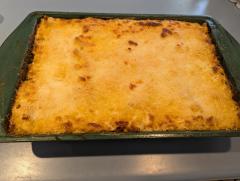 Lasagna is a wonderful Italian dish, an opportunity for all sorts of creativity, but there are two especially classic lasagna recipes that you should know about: this Lasagna alla Bolognese, and the Lasagna Napoletana. The Neapolitan version includes sausage and meatballs, fresh mozzarella and ricotta, it's quite a complex production! The Bolognese version is far simpler, just lasagna noodles,
Lasagna is a wonderful Italian dish, an opportunity for all sorts of creativity, but there are two especially classic lasagna recipes that you should know about: this Lasagna alla Bolognese, and the Lasagna Napoletana. The Neapolitan version includes sausage and meatballs, fresh mozzarella and ricotta, it's quite a complex production! The Bolognese version is far simpler, just lasagna noodles, 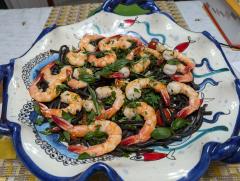 This is a primo version of the classic Trieste dish Scampi alla Busara, but the traditional scampi (langoustines) are hard to come by in New England, and when made with shrimp it's a great pasta-topper!
This is a primo version of the classic Trieste dish Scampi alla Busara, but the traditional scampi (langoustines) are hard to come by in New England, and when made with shrimp it's a great pasta-topper!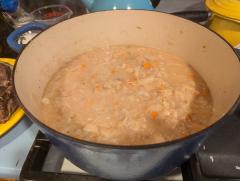 Despite its name proclaiming a Genoese origin, this delicious Neapolitan pasta sauce, a cousin of the French soubise onion sauce, is unknown in Genoa today. It is thought to have been brought to Naples by sailors from Genoa long ago, and to have survived in the south long after it faded into obscurity in the north.
Despite its name proclaiming a Genoese origin, this delicious Neapolitan pasta sauce, a cousin of the French soubise onion sauce, is unknown in Genoa today. It is thought to have been brought to Naples by sailors from Genoa long ago, and to have survived in the south long after it faded into obscurity in the north. This is not a vegetarian recipe. A beef roast cooks with the onions, flavoring them, but it is not served in the sauce or with the pasta at all. In Italy it's traditional to have a simple pasta course before a main course, the primo before the larger secondo. At a fine dinner, you would expect a small dish of pasta with one of the many wonderful sauces (ragu, sugo, salsa) invented for the purpose. A heaping plate of spaghetti is what you eat when you can't afford the secondo course.
This is not a vegetarian recipe. A beef roast cooks with the onions, flavoring them, but it is not served in the sauce or with the pasta at all. In Italy it's traditional to have a simple pasta course before a main course, the primo before the larger secondo. At a fine dinner, you would expect a small dish of pasta with one of the many wonderful sauces (ragu, sugo, salsa) invented for the purpose. A heaping plate of spaghetti is what you eat when you can't afford the secondo course.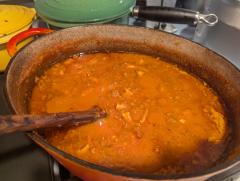 This is the classic Italian meat sauce, with an official recipe approved by the Accademia Italiana della Cucina and recorded with the Bologna Chamber of Commerce. The recipe gets updated every few generations to account for the changing availability of ingredients, and importantly, to note which popular variations that have arisen are incompatible with the Accademia's focus on authenticity and quality (for example, using cream instead of milk, or brandy instead of dry wine).
This is the classic Italian meat sauce, with an official recipe approved by the Accademia Italiana della Cucina and recorded with the Bologna Chamber of Commerce. The recipe gets updated every few generations to account for the changing availability of ingredients, and importantly, to note which popular variations that have arisen are incompatible with the Accademia's focus on authenticity and quality (for example, using cream instead of milk, or brandy instead of dry wine).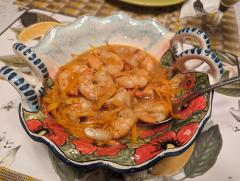 Here's another unexpected and delicious flavor combination from Italy, somewhat Americanized. The original Italian recipe, gamberoni all'arancia in padella, used olive oil instead of butter, used bigger shrimp, it skipped the brief marination step, and it did not include the orange zest. I tried it that way first, but then I did it this way and we both liked it better. I think the shredded orange zest makes it more pretty, too.
Here's another unexpected and delicious flavor combination from Italy, somewhat Americanized. The original Italian recipe, gamberoni all'arancia in padella, used olive oil instead of butter, used bigger shrimp, it skipped the brief marination step, and it did not include the orange zest. I tried it that way first, but then I did it this way and we both liked it better. I think the shredded orange zest makes it more pretty, too.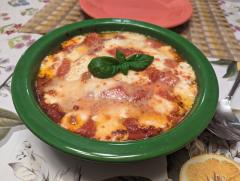 This is a staple of children's menus but it's also a delightful primo course when made with good ingredients and fresh gnocchi, and it's vegetarian, too! Kids like it because it has no garlic or onion, but top-quality ingredients really shine, like bright sunny Sorrento in the summer!
This is a staple of children's menus but it's also a delightful primo course when made with good ingredients and fresh gnocchi, and it's vegetarian, too! Kids like it because it has no garlic or onion, but top-quality ingredients really shine, like bright sunny Sorrento in the summer! 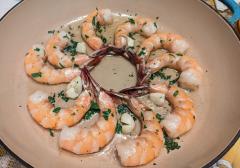 This recipe for gamberoni al forno (baked jumbo shrimp) is simple and easily expandable. It has just four ingredients, three of which you probably have in the kitchen most days.
This recipe for gamberoni al forno (baked jumbo shrimp) is simple and easily expandable. It has just four ingredients, three of which you probably have in the kitchen most days.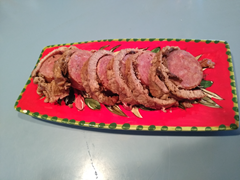 Cotechino in Camicia means "Cotechino in a shirt" because in this recipe the unctuous cotechino sausage is wrapped in a shirt of lean chicken!
Cotechino in Camicia means "Cotechino in a shirt" because in this recipe the unctuous cotechino sausage is wrapped in a shirt of lean chicken! Camillo Benso, the Count of Cavour was a hugely important 19th century Sardinian and Piedmontese politician and patriot who also is known for his favorite dishes of traditional Piedmontese cuisine. Like many Piedmontese dishes, this one uses butter where recipes from more southerly states would use olive oil, and it uses the Grana Padano cheese of Piemonte and Lombardia where other dishes would use Parmigiano-Reggiano.
Camillo Benso, the Count of Cavour was a hugely important 19th century Sardinian and Piedmontese politician and patriot who also is known for his favorite dishes of traditional Piedmontese cuisine. Like many Piedmontese dishes, this one uses butter where recipes from more southerly states would use olive oil, and it uses the Grana Padano cheese of Piemonte and Lombardia where other dishes would use Parmigiano-Reggiano.